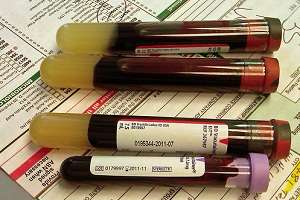Biomarkers to finetune depression treatment

The use of inflammatory and oxidative stress biomarkers in psychiatry may have the potential to improve treatment efficacy and aid in the diagnosis of major depression, a review has found.
Major depression is a common mental disorder with current treatment remission rates reaching 20–40 per cent.
Currently, the assessment and treatment of depression is carried out through a combination of patient interviews, self-reports and questionnaires.
Murdoch University PhD student and clinical psychologist Adrian Lopresti reviewed existing studies outlining the potential of inflammatory and oxidative peripheral biomarkers in aiding diagnosis, predicting treatment response, and preventing the onset of major depression.
Mr Lopresti says the researchers reviewed biomarkers because the area is gaining momentum in depression studies.
"Over the last 10 years, researchers have also found that depression is associated with high levels of inflammation and free radical damage," he says.
"When the body is inflamed, there is an imbalance in the levels of serotonin – a neurotransmitter in the brain – which may influence mood in a way that leads to depression.
"Thus, by assessing blood samples, we can look for these markers to treat inflammation and oxidative stress."
Mr Lopresti says biomarkers could potentially help guide clinicians in choosing the right treatment for depressed individuals.
"For instance, there was one study in which an anti-inflammatory drug [infliximab] was administered to patients with major depression and when the group was examined as a whole, researchers found the infliximab drug did not work," he says.
"However, when a sub-group of the depressed patients with high levels of inflammation were examined, the researchers found that the anti-inflammatory drug worked for them."
He says biomarkers could determine if people with high levels of inflammation have a greater chance of developing depression five years later.
"Although this is an area that requires greater research, we believe that these inflammatory and oxidative stress biomarkers can help with the diagnosis, treatment matching, and potentially the prevention of depression."
However, for clinicians to be able to use biomarkers and learn more about them, Mr Lopresti says there has to be greater consistencies across research.
"Typically, blood, urine and saliva samples are collected in depression research studies; and within blood collections, serum and whole blood are used for biomarker measurement resulting in variations in the specimens utilised to make comparisons.
"We are hoping that in the next 10 years, when there is more consistency in the research we can introduce biomarkers into clinical practice."
More information: www.sciencedirect.com/science/ … ii/S0278584613002121
















